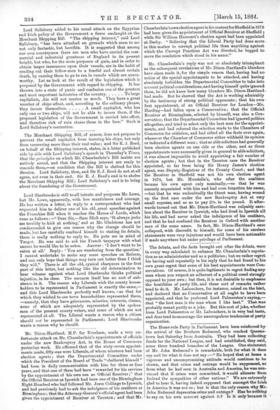Mr. Chamberlain's reply was not so absolutely triumphant as the
subsequent revelations of Mr. Dixon-Hartland's blunders have since made it, for the simple reason that, having had no notice of the special appointments to be attacked, and having absolutely forbidden the Departmental Committee to take into account political considerations, and having himself quite ignored them, he did not know how•many blunders Mr. Dixon-Hartland. had made. But he showed that the Act is working admirably by the testimony of strong political opponents ; that his own • first appointment, of an Official Receiver for London—Mr. Harding—had fallen upon a Conservative ; that the Official Receiver at Birmingham, selected by himself, was also a Con- servative; that the Departmental Committee had ignored politics altogether, and tried to select only the best men for the appoint- ments, and had referred the selection made to the Chambers of Commerce for criticism, and had sifted all the facts over again,. whenever the Chamber of Commerce either withheld its opinion or indicated a different man ; that as able solicitors had generally- been election agents on one side or the other, and as these appointments were necessarily given in general to able solicitors,. it was almost impossible to avoid appointing a fair number of election agents ; but that in the Taunton case the Receiver- appointed, so far from being Sir Henry James's election agent, was -Deputy-Registrar of the County Court ; and that the Receiver in Sheffield was not his own election agent in 1874, but Mr. Mundella's, who after the coalition became his own agent only nominally,—so that he was
acquainted with him and had even forgotten his name,. —but that he was undoubtedly the fittest man, having wound up the first case under the new Bankruptcy Act at vary small expense, and so as to pay 20s. in the pound. It after- wards turned out that Mr: Dixon-Hartland was culpably care- less about the Receiver in Ipswich, who had lived in Ipswich all his life, and had never asked the indulgence of his creditors,. and that he had confused the Receiver in Oxford with another man of the same name. In fact, Mr. Dixon-Hartiand's case collapsed, with discredit to himself, for some of his careless. statements were very injurious and would have been actionable- if made anywhere but under privilege of Parliament.


































 Previous page
Previous page